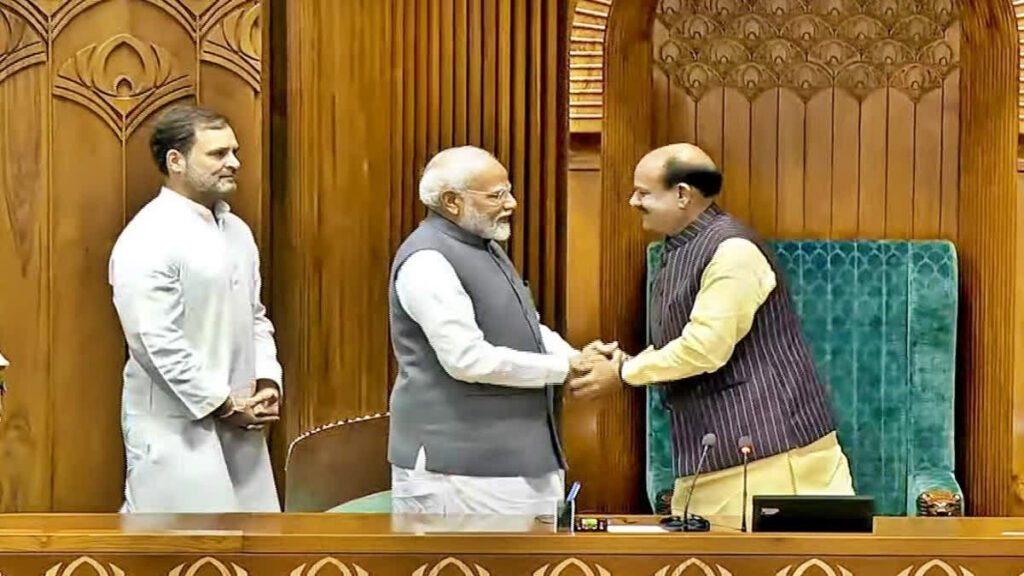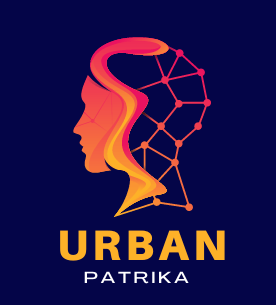
Introduction Rahul Gandhi Accuses Om Birla
In a recent turn of events, Congress leader Rahul Gandhi Accuses Om Birla made headlines by accusing Lok Sabha Speaker Om Birla of bowing down while shaking hands with Prime Minister Narendra Modi. This incident has stirred the political landscape, leading to various interpretations and reactions from different corners of society. In this article, we’ll delve into the details of this incident, exploring the perspectives of those involved and its broader implications.
Background Information
Who is Rahul Gandhi?
Rahul Gandhi is a prominent figure in Indian politics, serving as a member of the Indian National Congress (INC). As the scion of the Nehru-Gandhi family, his political career has been closely watched and often scrutinized. He has held various positions within the party and has been a vocal critic of the Bharatiya Janata Party (BJP) and its leaders.
Who is Om Birla?
Om Birla is the current Speaker of the Lok Sabha, the lower house of India’s Parliament. A member of the BJP, he has held this esteemed position since June 2019. His role as Speaker involves maintaining order during debates, ensuring parliamentary rules are followed, and representing the house in all its functions.
Who is PM Modi?
Narendra Modi is the current Prime Minister of India, serving since May 2014. As a leader of the BJP, he has been a central figure in Indian politics, known for his strong leadership style and significant political influence both within India and internationally.
The Incident
Description of the Handshake
The incident in question took place during a formal meeting where Om Birla greeted PM Modi. During this exchange, Rahul Gandhi observed that Birla bowed slightly while shaking hands with the Prime Minister. Gandhi interpreted this gesture as a sign of undue deference, sparking a controversy.
Rahul Gandhi’s Accusation
Rahul Gandhi openly criticized Om Birla, accusing him of bowing down to PM Modi. Gandhi suggested that this act symbolized a deeper issue of bias and lack of impartiality within the political framework. His comments have ignited a debate about the roles and conduct of public officials.
Rahul Gandhi’s Perspective
Details of Rahul’s Statement
In his statement, Rahul Gandhi emphasized the importance of neutrality and independence in the functioning of parliamentary roles. He argued that the Speaker of the Lok Sabha should maintain an unbiased stance and that Birla’s gesture compromised this principle. Gandhi’s accusation was not just about the physical act but also what it represented in terms of political ethics.
Context Behind the Accusation
Rahul Gandhi’s accusation comes at a time when the Indian political scene is highly polarized. His critique of Om Birla is seen as part of his broader strategy to challenge the BJP’s dominance and question the impartiality of key political figures. Gandhi’s remarks are in line with his ongoing efforts to present the Congress party as a viable alternative to the current government.
Om Birla’s Response
Explanation Given by Om Birla
In response to Rahul Gandhi’s accusation, Om Birla clarified that his gesture was merely a sign of respect and had no political connotations. He emphasized that as the Speaker of the Lok Sabha, his actions are guided by the principles of decorum and respect for all members, regardless of their political affiliations.
His Reasoning and Justification
Birla explained that bowing slightly is a cultural gesture of respect common in Indian society. He argued that interpreting this act as a sign of bias was unwarranted and that his track record as Speaker demonstrates his commitment to impartiality and fairness in the parliamentary process.
Political Implications
How This Incident Affects the Political Climate
The incident has further polarized the political environment in India. Supporters of the Congress party see Gandhi’s accusation as a justified critique, while BJP supporters defend Birla’s actions as respectful and appropriate. This event has added another layer to the ongoing political debates and rivalries.
Reactions from Other Political Figures
Various political figures have weighed in on the incident. Some have supported Gandhi’s view, arguing for greater scrutiny of public officials’ conduct. Others have defended Birla, emphasizing the importance of cultural respect and the need to avoid over-politicizing such gestures. These diverse reactions highlight the complexity of interpreting political actions in a highly charged environment.
Public Reaction
Social Media Responses
Social media platforms have been abuzz with opinions on the incident. Hashtags related to the event have trended, with users expressing a wide range of views. Memes, videos, and posts critiquing or supporting the involved parties have proliferated, showcasing the public’s engagement with political discourse.
Public Opinion and Media Coverage
Mainstream media outlets have also extensively covered the incident, with various news channels and newspapers providing detailed analyses. Public opinion appears divided, reflecting the broader political divide in the country. Some view the incident as trivial, while others believe it underscores significant issues regarding political impartiality.
Historical Context
Similar Incidents in Indian Politics
Indian politics has seen its fair share of similar incidents where gestures and actions have been interpreted as signs of bias or allegiance. These incidents often become focal points for broader political arguments, reflecting the contentious nature of political interactions in the country.
Analysis of Past Interactions Between Political Leaders
Past interactions between political leaders have sometimes been fraught with tension and controversy. Analyzing these interactions can provide insight into the current incident, highlighting patterns and the evolving nature of political decorum in India.
Body Language in Politics
The Significance of Body Language
Body language plays a crucial role in political interactions. Gestures, expressions, and postures can convey respect, dominance, agreement, or dissent. In a politically charged environment, such as India’s, these non-verbal cues are often scrutinized and analyzed for underlying messages.
How Body Language Can Be Interpreted
Interpreting body language requires an understanding of cultural context and individual behavior. What might be seen as a sign of respect in one context could be interpreted as submissiveness in another. This complexity makes the analysis of political body language both fascinating and challenging.
Rahul Gandhi’s Political Strategy
His Approach to Challenging PM Modi
Rahul Gandhi’s strategy involves directly challenging PM Modi and the BJP on various fronts. By highlighting perceived biases and questioning the conduct of political figures, Gandhi aims to position himself and the Congress party as defenders of democratic principles and impartiality.
Analysis of Rahul Gandhi’s Recent Political Moves
Gandhi’s recent political moves have been marked by bold statements and actions aimed at galvanizing support. His focus on issues like impartiality, corruption, and governance reflects his broader strategy to counter the BJP’s narrative and appeal to a diverse electorate.
Om Birla’s Role as Speaker
Responsibilities of the LS Speaker
The Speaker of the Lok Sabha has the crucial responsibility of ensuring that parliamentary proceedings are conducted smoothly and fairly. This role requires maintaining order, ensuring adherence to rules, and representing the house in its dealings with the executive and the public.
How This Incident Impacts His Role
The incident has put Om Birla’s role under the spotlight, with some questioning his impartiality. However, Birla’s response and his track record as Speaker suggest a commitment to fairness and respect for all members. This event may serve as a reminder of the delicate balance required in parliamentary roles.
Media’s Role in Politics
Media Coverage of Political Events
The media plays a pivotal role in shaping public perception of political events. Coverage of incidents like this one influences how the public interprets and reacts to political actions. Media outlets often provide diverse perspectives, contributing to a more informed and engaged citizenry.
The Impact of Media on Public Perception
Media coverage can amplify certain aspects of political events, shaping the narrative and influencing public opinion. In this case, the media’s portrayal of the handshake incident and the subsequent reactions have contributed to the broader debate about political conduct and impartiality.
Conclusion
The incident involving Rahul Gandhi’s accusation against Om Birla has highlighted the complexities of political interactions and the importance of maintaining impartiality in public roles. While Gandhi’s critique underscores the need for vigilance
Rahul Gandhi Accuses Om BirlaRahul Gandhi Accuses Om BirlaRahul Gandhi Accuses Om BirlaRahul Gandhi Accuses Om BirlaRahul Gandhi Accuses Om BirlaRahul Gandhi Accuses Om BirlaRahul Gandhi Accuses Om BirlaRahul Gandhi Accuses Om BirlaRahul Gandhi Accuses Om BirlaRahul Gandhi Accuses Om BirlaRahul Gandhi Accuses Om BirlaRahul Gandhi Accuses Om BirlaRahul Gandhi Accuses Om BirlaRahul Gandhi Accuses Om BirlaRahul Gandhi Accuses Om Birla

